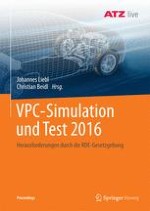2017 | OriginalPaper | Buchkapitel
Anforderungen an die virtuelle NVH-Optimierung von Antrieben in Fahrzeugen
verfasst von : Dr. Marcus Hofmann, Dipl -Ing Torsten Philipp, Dr. Christoph Priestner, Dipl -Ing Bernhard Graf
Erschienen in: VPC – Simulation und Test 2016
Verlag: Springer Fachmedien Wiesbaden
Aktivieren Sie unsere intelligente Suche, um passende Fachinhalte oder Patente zu finden.
Wählen Sie Textabschnitte aus um mit Künstlicher Intelligenz passenden Patente zu finden. powered by
Markieren Sie Textabschnitte, um KI-gestützt weitere passende Inhalte zu finden. powered by
Beside typical attributes like performance, drivability and fuel consumption, the NVH performance is one of the major criteria to characterize a vehicle and contributes significantly to the driving experience. On the other hand the mainstream in automotive industry is driven by CO2 reduction and as a consequence downsizing, lightweight designs, friction optimization and electrification are dominating the development landscape. Many of these tasks are in contradiction to NVH and therefore challenging the NVH development work.Traditionally the NVH behavior of a vehicle was developed at the time when first prototype vehicles were available in hardware rather late in development on road or on acoustic chassis dynos. This late development in many cases caused some last minute actions – so called trouble shooting activities. Nowadays having more vehicle derivatives, increased complexity in powertrains and reduced development time, it is mandatory to ensure an early involvement of NVH development.Virtual methods and simulation approaches are used to predict the NVH behavior of vehicle in an early phase. Due to the complexity of the physics of noise and vibration generation and its transfer, it is necessary to split the vehicle and drivetrain into sub-systems and components to be able to use virtual tools and methods to pre-optimize the NVH behavior.The following paper gives an overview about the state of the art NVH development considering source excitation, transfer paths and the possibilities and challenges to perform parts of the NVH development virtually by using suitable simulation tools. A special focus is put onto the virtual development of future powertrains (PHEV, BEV, etc.).
